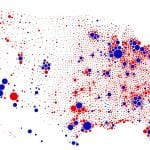Did you hear about the man who was detained for eating a sandwich on a San Francisco train platform?
A police officer detained and cited a man eating a sandwich on a San Francisco train platform, a confrontation captured on a viral video.
In the video posted on social media, the Bay Area Rapid Transit policeman told the man, later identified as Steve Foster, that eating on the platform is against state law.
Did you catch that? There is a state law against eating on the platform.
Do you know what laws are? Laws don’t stop an activity. They simply give permission for local law enforcement to hassle people. And when laws don’t involve violent crimes or property crimes—well.
It makes sense to give local law enforcement the ability to intervene—to detain, question, and arrest people—over violent crime and property crimes. Even here there are serious problems with profiling, and people have rights that should be (and often aren’t) respected. And our public defender system is a mess. But violent crimes and property crimes? It makes sense to give local law enforcement the authority to intervene.
Nonviolent offenses, though? What does society gain from the hassling of men like Foster? Or the woman who was arrested for selling churros in the New York City subway last week?
As reported with some tongue in cheek on Vice:
On Friday, a mere four NYPD officers surrounded an unidentified woman selling churros at the Broadway Junction stop in Brooklyn. As the NYPD later stated, the woman was simply handcuffed and written a ticket as her churro cart was “invoiced” upstairs. Was she crying? Maybe. Is it possible the city has forever traumatized a woman who was simply trying to make some money to feed her family in one of the most expensive locales in the world? Sure.
…
State Senator Julia Salazar argued the city shouldn’t be “criminalizing someone at all for selling churros.” City Comptroller Scott Stringer said taking on churros “doesn’t make anyone safer.” City councilman Rafael Espinal claimed the cops “overreached.” “Over-policing our subways isn’t going to solve anything,” said City Council speaker Corey Johnson. “We can keep the subway safe without harming people just trying to earn a living.”
So that happened.
There are many, many, many laws like this. Laws about where you can and can’t sell food, laws about where you can and can’t eat food, and on and on and on and on. That these laws are unevenly enforced goes without saying; populations that are over-policed end up bearing the brunt of them. But it’s worse than that. Fines for nonviolent offenses aren’t adjusted by income. The rich can pay them; the poor cannot.
Take parking tickets, for example. In many cities, cars can be seized and sold over unpaid parking tickets. The city of Chicago, for example, has seized and sold 50,000 cars over unpaid parking tickets since 2011. A report in California found that vehicle impoundment had a significant affect on low wage workers’ ability to earn an income—in fact, “lack of access to reliable transportation” was “the second biggest immediate barrier to employment, behind reliable child care.” And when a vehicle is impounded—well.
When I get a ticket—and it does occasionally happen, I do live in a city—I have the ability to pay it. But not everyone does. And even when a low wage worker living paycheck to paycheck does have the ability to pay a parking ticket, that ticket sets them back by a much more substantial proportion of their income.
Tickets and fines are regressive. Period. They hurt people with low incomes more than they hurt people with high incomes. It’s simple math. The result is a system that disproportionately penalizes the poor.
In New York City, food selling permits are so limited people are forced to buy permits for thousands of dollars on the black market, or risk selling food without one. It seems we’ve embraced the gig economy when it comes to Lyft or Uber, but not when it comes to things like selling food on the street. Imagine having to choose between buying a $10,000 permit to drive for Lyft or Uber on the black market, and risking arrest—and being short on rent, with few other options. Why do we create policies that put people in situations like this?
Does the relative lack of pricey permitting for Uber and Lyft drivers have something to do with the fact that it’s a gig white college educated workers are will ing to do? Is the gig economy itself discriminatory? Have we embraced gigs white college educated people are willing to do, creating highly minimal regulation for them, while simultaneously highly regulating gigs traditionally done by poor or immigrant workers?
And then, of course, there’s the problem of the public defender system. Once someone is in trouble with the law, what happens next depends largely on how much money the person has. And that is obscene. Yes, people who don’t have money can get a public defender—but these individuals have so many cases they can often spend only a few minutes on each one. Meanwhile, someone with the money can hire a fancy lawyer.
The whole system feels rigged.
I don’t have a perfect solution, but I think we could start fixing some of this by getting rid of unnecessary laws. Why not get rid of the law about eating on train platforms and replace it with a public information campaign that urges riders to be courteous and alerts them to the fact that food waste attracts rats? Why not lift the cap on mobile food vending permits in NYC, which would eliminate the black market for these permits and them them accessible? Or—perish the thought—why not consider removing the permitting requirement altogether?
I understand that certain rules do need to exist for public health and safety reasons. I am not denying that. But we need to be aware that any time we create a rule, we open the door for penalizing—or even criminalizing—those who may not follow this rule, and we need to be aware that such rules are unevenly enforced. When we create rules like these, we open the door to black men being detained on train platforms and churro sellers who don’t speak English being surrounded by police in subway stations.
We have to do better than this.
I have a Patreon! Please support my writing!















